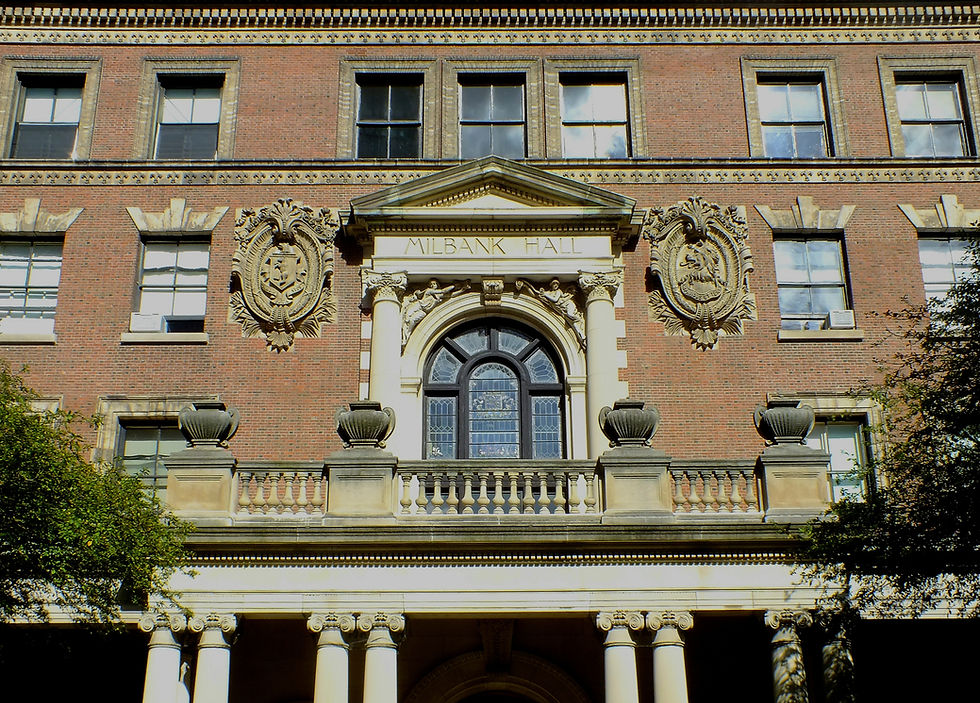From D.C. to Morningside Heights: How the federal shutdown is reaching NYC campuses
- Oct 18, 2025
- 3 min read
As the federal government shutdown persists, its consequences stretch to New York City. From travel delays to housing, Barnard and Columbia students are feeling the ripple effects of Washington’s unwillingness to compromise.

Photo by Haley Scull/The Barnard Bulletin
By Sitara Reganti and Chase Taylor
October 18, 2025
The federal government shutdown that began on October 1 is already sending ripple effects across the country. While it may seem like a distant issue in Washington D.C., Barnard and Columbia students may soon feel its impact much closer to home: New York City’s museums, housing programs, and even their daily commutes.
A shutdown occurs when Congress fails to pass spending bills by the start of the fiscal year, October 1. According to CBS, many federal agencies rely on these funds to operate; without them, they must either scale back or stop services altogether. Lawmakers sometimes pass short-term extensions, known as continuing resolutions, to keep the government running during negotiations. However, if a deal is not reached, only essential services, such as national defense and public safety, continue operating. This process of appropriating funds is rooted in the Constitution and enforced by the Antideficiency Act, which prevents the government from spending money that has not been authorized by Congress.
For Barnard and Columbia students, the shutdown’s effects may become visible in several areas of daily life. Housing programs, for one, are at risk. The City, a news outlet for New Yorkers, states the New York City Housing Authority could lose federal funding for operations and rent vouchers as early as November, placing additional stress on families in low-income housing. For students living off-campus in nearby neighborhoods like Harlem and Morningside Heights, these funding gaps could deepen existing housing inequalities within the community.
According to the NYU Furman Center’s research on Morningside Heights/Hamilton area “the change in median gross rent outpaced the change in median household income by 14.3 percentage points. In 2023, 30.9% of renter households in Morningside Heights/Hamilton were severely rent burdened (spent more than 50% of household income on rent).” Furthermore, homeownership in the area, which was 17.9 percent, was significantly lower than the city average of 32.5 percent. Housing inequalities already burden the area, and this government shutdown may just worsen the situation.
The City also claims the shutdown may disrupt travel. The Port Authority has confirmed that airports will remain open, but Transportation Security Administration staff and air traffic controllers will be required to work without pay — a situation that has caused major delays in past shutdowns, particularly at LaGuardia Airport. Students planning to travel home for fall break or the holidays might want to brace for longer lines and schedule changes.
Food insecurity across the city is also expected to rise once federal workers in New York begin missing paychecks starting October 10. Nicole Hunt, the director of public policy and advocacy at Food Bank for NYC, said “The organization is bracing for increased need among New Yorkers struggling to put food on the table.” This issue feels especially relevant on campus, where many students may volunteer with local food pantries or depend on these resources themselves.
In addition, NBC revealed White House budget director Russell Vought has also paused $18 billion in infrastructure projects, including the Hudson Tunnel Project and Second Avenue subway extension. Though these projects may seem removed from campus life, their delays could worsen congestion for faculty who commute from New Jersey or rely on the already crowded 4/5/6 subway lines.
The city’s cultural institutions are also feeling the strain. As of Sunday, October 12, the National Museum of the American Indian — alongside all other Smithsonian institutions — is closed again. The Cooper Hewitt Smithsonian Design Museum is also temporarily closed, suggesting that closures, not ones from their ongoing construction project, could be imminent if the impasse in Washington continues.
For some students, the shutdown’s effects are personal. “As a Congressional District Intern in the Office of Congressman Hakeem Jeffries, I am currently furloughed as a result of the government shutdown,” said Andrew Morrissey (CC ’27). “There is a debate to be had about weighing the impacts of a government shutdown on both federal employees and recipients of federal subsidies under the Affordable Care Act.”
Morrissey noted that the political gridlock stems from partisan disputes over healthcare funding. “Ultimately, we find ourselves in this situation because Democrats continue to fight for the extension of these subsidies as ACA Marketplace open enrollment begins next month, leaving beneficiaries with little time to receive their benefits,” he added. ACA Marketplace is a program created by the Affordable Care Act that helps people enroll in insurance plans.
As Congress remains deadlocked, the shutdown’s effects are rippling outward, from stalled federal programs to city services and student experiences. Whether through food insecurity, housing instability, delayed travel, or the closure of cultural landmarks, Barnard and Columbia students are watching how national politics shape the rhythm of life in New York City.




